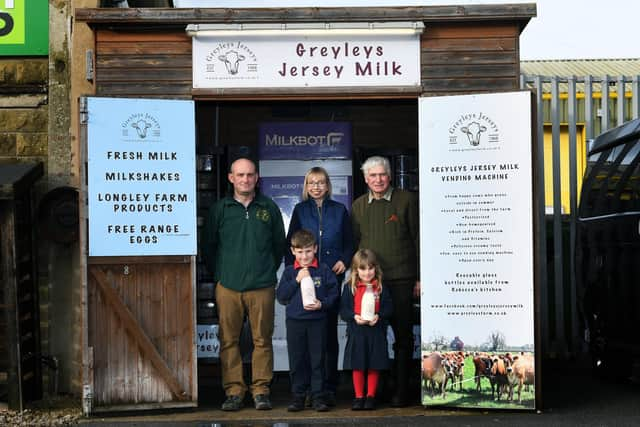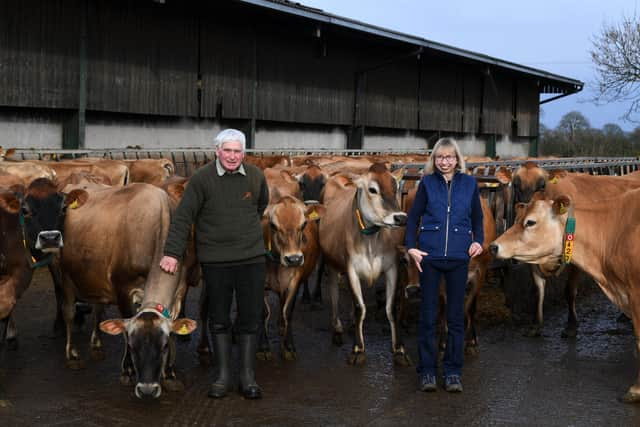Farm of the Week: Yorkshire family who are 'formidable force' in Jersey cattle world
Helen Stanier took over the management of Grey Leys from her father David Shaw when she came back to the farm following a career with the Cooperative in Manchester. David had started the pedigree herd with 13 heifers in 1968, and he and his wife Anne have been a formidable force in the Jersey world for over 50 years.
“Mum and dad are still partners in the business and very much involved in the running of the farm,” says Helen.
Advertisement
Hide AdAdvertisement
Hide Ad“My husband Craig and I joined them eleven years ago and I’ve taken over the day-to-day running of all the paperwork and staff management as well as my dairying duties.


Grey Leys was awarded Best Jersey Herd, Best Cow Family, Best Bull Progeny and Best In-Calf Heifer at The Bridge Inn in February. Helen says their policy of being more efficient on farm is paying dividends at a time when costs of production are volatile.
“Our herd yielding has increased significantly and is now at 6000 litres per cow. It’s about being a bit more efficient with them. That comes through breeding, feeding and looking more closely at their welfare.
“Our best cows are now giving more milk and they also have more space, which really helps. Craig put in additional feed barriers and we’ve added to our existing parlour. They are general infrastructure improvements. We’ve a lot more to do.
Advertisement
Hide AdAdvertisement
Hide Ad“Some Jersey herds are yielding 7000 to 7500 litres, so there’s potential for more, but I don’t want that at the expense of longevity, fertility or health, so a slow and steady increase is what I’m looking for.


“We regularly review our genetics and monitor fat and protein content from the cow’s milk and how much milk they’re giving. We classify all the cows, looking towards a baseline perfect cow. We breed to improve each by the next generation by selecting sires that best fit.
“The Jersey cow has altered quite a lot since 1968 when dad started with them. She’s bigger in stature with higher fat and protein in her milk and has always been known for higher quality milk. We are developing that further as a society through breeding.
“We currently have 245 cows at Grey Leys, slightly down on a few years ago because we are more efficient. Our cows are mostly descended from those 13 heifers dad first bought. A cow called Lettuce was one of our original heifers and it is the Cabbage family, that Lettuce was from, that won the Best Cow Family Award.
Advertisement
Hide AdAdvertisement
Hide AdAnother key area Helen recognised was the hours being worked by everyone.
“We had three members of the team helping mum and dad, but they were all working ridiculously long hours and had no work/life balance. I’d come from working in a more regular hours job where people have appropriate time off and so we went down the less is more route.
“The same number of hours need to be filled, but they are now filled by six people either full-time or part-time, which includes students from Askham Bryan College and Bishop Burton College, and the balance has made everybody a bit happier and healthier.
“I suffer from rheumatoid arthritis and have done since I was 2 years old, so I’m not the same as a majority of farmers as I can’t do a lot of physical jobs myself. The way I work it is that I’m managing the team, but they’re doing more of the physical work. Fortunately, with the technology that’s around now farming does not have to be as physical as it once was.
Advertisement
Hide AdAdvertisement
Hide AdLooking after the herd and its future is very much Helen’s remit, husband Craig looks after some of the ways in which Grey Leys has expanded its operation into other areas, with vending machines and deliveries to clients.
“Most of our milk goes to Longley Farm,” says Helen. “We’ve been selling to Longley for around 20 years and it’s worthwhile because they treat our milk uniquely as it is going into their special Jersey products. We have two milk vending machines, one at Rydal Garage forecourt in Elvington and the other at Balloon Tree Farm Shop at Gate Helmsley.
“At the Rydal vending hut we also vend almost the whole range of Longley Farm Jersey produce and we’ve added milkshakes to our milk vending at both sites.
“Craig looks after all the milk processing for the vending machines in Elvington and Balloon Tree who are massive champions of local produce. Craig also handles all deliveries as we’ve developed a wholesale delivery business, supplying a lot of top restaurants and coffee shops and people making cheese and ice cream.
Advertisement
Hide AdAdvertisement
Hide AdJersey Bull Beef is another relatively new addition, sold locally and Helen says the feedback has been highly encouraging.
“People say it is incomparable to what you buy in the supermarket. It is tender, has quite a bit of marbling, which tends to be yellowy, and looks unique. We only have around 10-12 beasts going each year and my email list takes care of that at the moment. Our other beef calves from our Aberdeen Angus-crosses and British Blue-crosses are sold either privately or at York livestock market.
Everything at Grey Leys is about maintaining and improving the herd and self-sufficiency in feed.
“The herd is normally out by the beginning of April but we’re looking at another month at least this year. It’s very saturated.
Advertisement
Hide AdAdvertisement
Hide Ad“The farm runs to 420 acres and we grow 100 acres of grass for silage, 80 acres of maize and 60 acres wholecrop of peas and barley. We also have 130 acres of grazing for the herd.
“We are always looking for ways to be more sustainable. We are looking at getting closer to net zero, and recently installed variable speed motors for the milking parlour and a heat recovery unit which makes the milking parlour heat the water which washes out the milking parlour, not using additional hot water.
Helen says she’s delighted with the awards received recently, which also include a Great Taste Award and being nominated as a finalist in the Deliciously Yorkshire Awards last year
for Best Sustainable Product & Best Beverage.
Helen currently has her hands full with the farm, bringing up two young children - Alfred, who’s ‘mad for farming’, and Hattie; writing for a young arthritis sufferers’ magazine championing diversity in agriculture; running a calf show at the farm for young members of the Jersey Cattle Club; running the tearoom near the Jersey lines at the Great Yorkshire Show, inherited from her mum; and she has recently followed in her dad’s footsteps having gone on to the board of the Jersey Cattle Society.
Helen and Craig’s son Alfred is already ‘on the board’ too. Alfred had a second place at last year’s Wensleydale Show and he’s looking forward to joining granddad in showing at Otley Show next month.